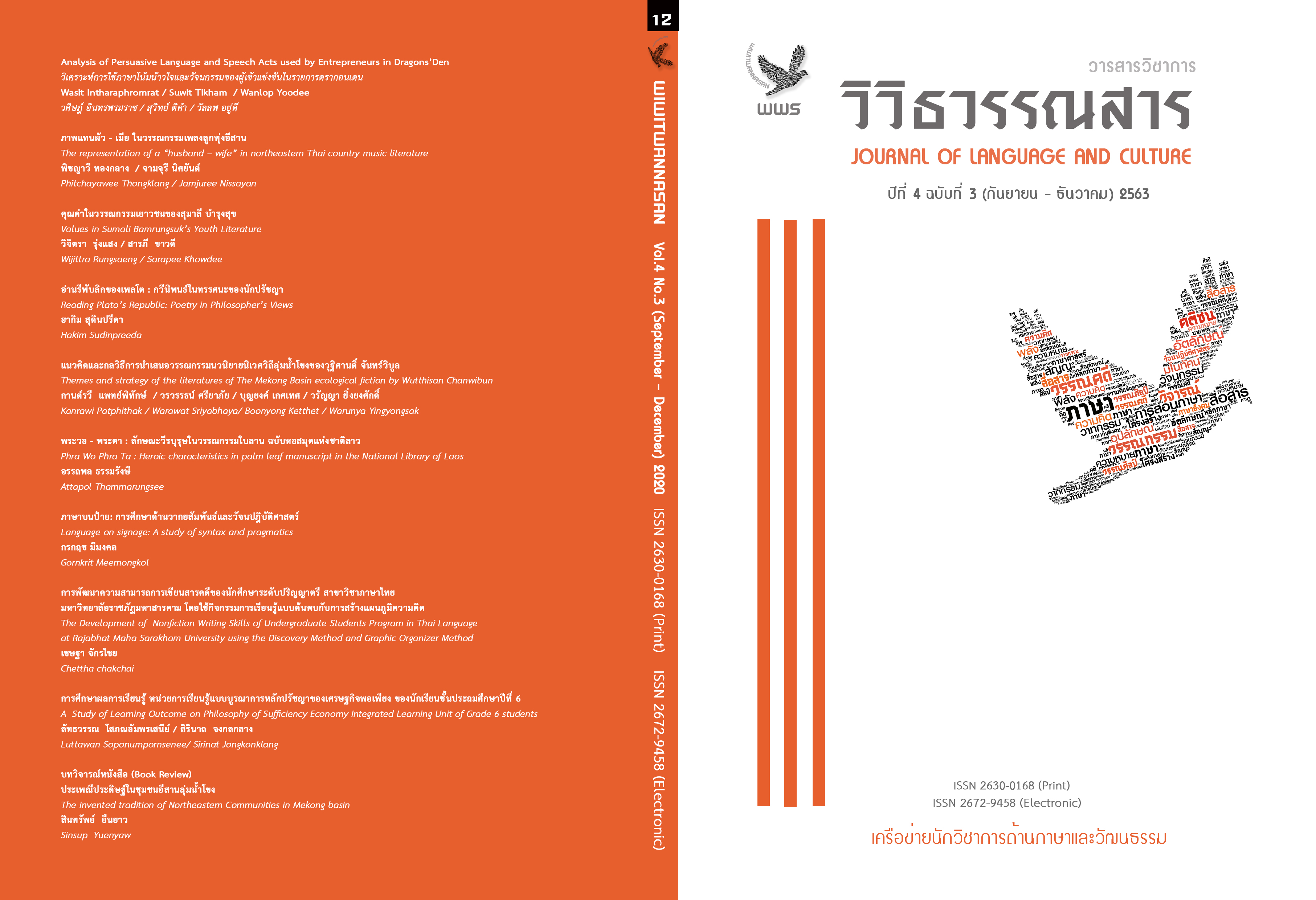The Development of Non-fiction Writing skills of Undergraduate Students Majoring in Thai Language Using the Discovery Method and Mind Mapping Method
Main Article Content
Abstract
The purposes of the current study were to develop a learning management plan for non-fiction writing skills using the discovery method and mind mapping method that met the efficiency criteria of 75/75, to study the effectiveness index of the developed learning management plan, and to compare non-fiction writing skills of undergraduate students majoring in the Thai language before and after learning with the developed learning management plan. Randomized by the purposive sampling method, the samples were 49 second-year undergraduate students majoring in the Thai language in the Faculty of Humanities and Social Sciences, Rajabhat Maha Sarakham University in the second semester of the 2019 academic year.
The instruments were a set of 6 learning management plans and a non-fiction writing test designed in 40 question items of multiple choices. The statistics used in data analysis were mean score, percentage, standard deviation, and a paired sample t-test. The results of the study were as follows.
The efficiency of the learning management for non-fiction writing skills using the discovery method and mind mapping method was found to at 78.73/80.77 which exceeded the criteria of 75/75. The effectiveness index of the developed learning management method was found at 0.5191. It could be interpreted that 51.91 % of the participants could improve their non-fiction writing skills after learning with the plan. Finally, the average participants’ score before learning with the developed learning management plan was at 24.00 while the score of the posttest was 32.31. There was a significant difference between the participants' pretest and posttest at a statistical level of .01.
Article Details
Copyright is that of the journal any reproduction must be permitted by the editor of journal
References
Chakchai, C. (2013). Kankhian Sarakhadi (In Thai) [Feature Writing]. Maha Sarakham: Faculty of Humanities and Social Sciences, Rajabhat Maha Sarakham University.
Dhamachon, T. (2005). Kanphatthana phaenkanchat kitchakam Kanrianru phasa thai duai klumruammue baep STAD rueang kan an choeng wikhro chan prathomsueksa pithi 5 doi chai phaenphum khwamkhit (In Thai) [The development of Thai language learning management in STAD collaborative instructional model for analytical reading of prathomsueksa 5 students using mind mapping] (Master’s thesis). Maha sarakham University,
Maha Sarakham.
Honghern, Y. (2010). Kanphatthana khwamsamat kankhian sarakhadi khong nakrian chan matthayomsueksa pithi 6 doi chai laeng rianru nai chumchon (In Thai) [The development of non-fiction writing exercises using local information for Matthayomsueksa 6 students] (Master’s thesis). Khon Kean University, Khon Kean.
Hongphu, S. (2007). Phon Kanchat kitchakam kanrianru wicha phasa thai rueang kankhian riangkhwam duai kanrian baep ruammue doi chai phaenphum khwamkhit chan prathomsueksa pithi 5 (In Thai) [The effects of learning management entitled collaborative essay writing using mind mapping method on Prathomsueksa 5 students] (Master’s thesis). Mahasarakham University, Maha Sarakham.
Khaemanee, T. (2012). Sat kanson : ong khwamru phuea kanchatkrabuankan rianru thi mi prasitthiphap (In Thai) [Sciences of teaching: Principles for effective learning management]. Bangkok : Chulalongkorn University.
Khomkokkruat, S. (2004). Kanphatthana thaksa kankhian riangkhwam duai phaenphum khwamkhit wicha phasa thai chan Prathomsueksa pithi 6 (In Thai) [The development of composition writing skill using Thai language mind mapping of prathomsueksa 6 students] (Master’s thesis). Mahasarakham University, Maha Sarakham.
Mulkham, S. (2004). 21 Withi chatkan rianru : phuea phatthana krabuankan khit (In Thai) [21 learning managements for cognitive processes]. Bangkok: Phapphim.
Pholwatana, P. & Kanokudom, C. (2004). Sinlapa Kanchatkan rianru phasa thai chuang chan thi 4 (Matthayomsueksa pithi 4-6) (In Thai) [Art of Thai language learning management for the fourth level (Matayom 4-6)]. Bangkok: Ben Publishing.
Rangabtuk, W. (2002). Theknik lae kitchakam kanrianru thi nen phurian pen samkhan tam laksut kansueksa khanphuenthan phoso 2544 (In Thai) [Techniques and learning activities focusing on students centered method based on the 2001 core curriculum]. Bangkok: Phrikwan Graphic.
Rungkitleatskul, K. (2003). Kan chai laeng witthayakan nai chumchon phuea phatthana kan khian laorueang khong nakrian chan Prathomsueksa pithi 3 (In Thai) [Using community resources for improving narrative writing of pratomsuksa 3 students] (Master’s thesis), Chiang Mai University, Chiang Mai.
Songkram, N. (2014). Kansueksa nok sathanthi lae kansueksa thi samuean phuea kanrianru choengruk (In Thai) [Fieldtrip and virtual fieldtrip for active learning]. Bangkok: Chulalongkorn University Press.
Srisuk, W. (2010). Phon kanchatkan rianru baep khonphop thimi to khwamsamat nai kan khit wikhro khong nakrian chan Prathom sueksa pithi 6 rongrian watbanghua suea (in Thai) [The effects of discovery approach on analytical thinking of grade 6 students in Watbanghuasuea school] (Master’s thesis). Dhonburi Rajabhat University, Bangkok.
Suntornroj. W. (2012). Nawattakam tam naeokhit baep backward design (In Thai) [Learning Innovation in backward design]. Mahasarkham : Mahasarakham University Press.
Susuaruj, P. (2008). Kan phatthana kankhit (In Thai) [Thinking development]. Bangkok: 9119 Technique Printing.
Tatphumee, W. (2013). Kan phatthana khwamsamat dan kankhian sarakhadi thongthin doi chai phaenphum khwamkhit prakopkanson baep khonphop (in Thai) [The development of local non-fiction writing skill using mind mapping and discovery learning method integration] (Master’s thesis). Mahasarakham University, Maha Sarakham.


